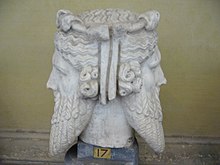Cilician pirates had dominated the Mediterranean sea until they were crushed by Pompey in 67-66 BCE.
^:_:^
But why did the Roman senate take no action in stopping the piracy until then? The rich people of Rome needed slaves to work for them. They bought those slaves from the pirates. But as time passed, the pirates became more and more powerful, and they eventually started attacking Roman cities. The senate's refusal to vanquish the pirates ended when the pirates attacked and plundered Ostia, a Roman port.
So what does this have to do with Caesar? In 75 BCE, Julius Caesar sailed to Rhodes to study oratory under Apollonius Molo (who was coincidentally the teacher of Marcus Tullius Cicero as well). On the way there, he was captured by the Cilician pirates who did not know his identity and demanded a ransom of twenty talents (approximately 620 kgs of silver). Caesar laughed at them and said he was worth fifty (approximately 1550 kgs of silver). He then sent his men to collect the money from different places. He was in captivity for thirty-eight days before his men came back with the ransom. During those thirty-eight days, he joined the pirates in their games, and wrote poems and speeches and criticized whoever did not appreciate them, calling them barbarians and threatening to have all of the pirates killed after he was released. After the ransom was paid and Caesar was set free, he sailed to Miletus and gathered some ships, and sailed back and captured the pirates.
This event of Caesar with the pirates was narrated by both Seutonius in his The Lives of the Caesars and Plutarch in his Parallel Lives.
References:
Julius Caesar
Cilician Pirates
Check out my blog about unusual animals, book reviews and my own writings and Diya has something to say
Subscribe to:
Post Comments (Atom)
The Roman Calendar
Have you ever wondered why September from “septem” in Latin means seven but is actually the ninth month? They actually come from the ancient...

-
In 81 BCE, the Romans conquered Mytilene, a small island in Greece. This is called the siege of Mytilene. At that time, Julius Caesar was a...
-
Auctor is Latin for author. Julius Caesar is often portrayed in his later years as a dictator and a powerful military commander. However, ...
-
Cilician pirates had dominated the Mediterranean sea until they were crushed by Pompey in 67-66 BCE. ^:_:^ But why did the Roman senate t...
No comments:
Post a Comment